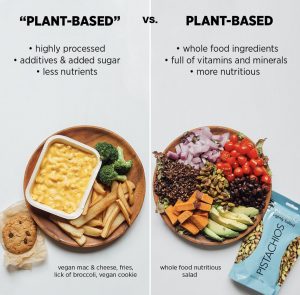Finding the Advantages of Plant Based Meals in Encouraging Healthy Food Choices
Plant-based meals supply various benefits that can enhance healthy eating habits. They prioritize nutrient-dense ingredients, adding to general well-being. These meals are rich in essential minerals and vitamins, which can cause boosted energy levels and digestion. Additionally, they play a considerable role in weight monitoring and persistent condition avoidance. The effects prolong past individual wellness, touching on environmental sustainability. Discovering these elements exposes an engaging instance for incorporating extra plant-based foods into everyday diets.
Understanding Plant-Based Diet Regimens
What specifies a plant-based diet plan? A plant-based diet mainly contains foods stemmed from plants, including veggies, fruits, seeds, grains, and nuts. While it highlights plant foods, it is not necessarily vegetarian or vegan; some people may include small quantities of pet products. The core concept revolves around focusing on plant foods for their nutritional advantages and ecological sustainability. This diet plan encourages the usage of entire, minimally refined foods, commonly leading to a boosted consumption of necessary nutrients. Additionally, plant-based consuming promotes cooking creative thinking, as people discover diverse dishes and flavors. Ultimately, a plant-based diet regimen can be adapted to match numerous way of lives and choices, making it a versatile choice for those looking for to integrate more plant foods right into their dishes.
Health And Wellness Advantages of Plant-Based Foods
A plant-based diet regimen offers a wide variety of health and wellness benefits that can improve general wellness. Study shows that individuals following this diet plan often experience reduced threats of chronic conditions, such as cardiovascular disease, diabetes mellitus, and particular cancers. Rich in minerals, antioxidants, and vitamins, plant-based meals sustain immune function and advertise cellular health. In addition, these diet regimens are usually high in nutritional fiber, which assists food digestion and assists keep healthy and balanced cholesterol levels. The inclusion of whole foods, such as fruits, veggies, legumes, and entire grains, adds to improved energy levels and psychological clearness. Additionally, the anti-inflammatory properties located in numerous plant-based foods can help in reducing swelling in the body, promoting better joint and cardiovascular health and wellness.
Impact on Weight Administration
The effect of plant-based meals on weight management can be substantial because of their nutrient thickness and lower calorie intake. These meals usually provide vital vitamins and minerals while decreasing empty calories, promoting much healthier eating routines. As an outcome, people may find it less complicated to lose or preserve weight through a plant-based diet regimen.
Nutrient Density Benefits
While many diet plans concentrate on calorie restriction, the principle of nutrient density provides a more alternative strategy to weight administration. Nutrient-dense foods are abundant in vitamins, minerals, and antioxidants while being reduced in calories. This permits people to consume bigger sections without surpassing their caloric needs. Plant-based meals, which commonly consist of fruits, vegetables, entire grains, and vegetables, exemplify nutrient thickness. These foods not just support weight monitoring but additionally promote satiety, lowering the probability of overeating. Furthermore, a high intake of nutrient-dense foods can cause improved metabolic wellness, as they give the required nutrients for peak physical feature. Inevitably, focusing on nutrient thickness can assist in much healthier consuming patterns and contribute to sustainable weight management methods.
Lowered Calorie Intake
Minimized calorie intake plays a significant role in effective weight administration, as it directly influences an individual's power balance. Plant Based Beef. Plant-based dishes are usually lower in calories while being abundant in important nutrients, making them an ideal choice for those looking for to decrease calorie usage without giving up nourishment. By incorporating extra fruits, vegetables, entire grains, and vegetables, individuals can enjoy bigger portion dimensions that promote satiation. This technique not just aids in weight reduction yet additionally cultivates lasting consuming behaviors. Additionally, plant-based diet regimens commonly decrease the intake of refined foods high in included sugars and harmful fats, which can contribute to excess calorie intake. Eventually, an emphasis on plant-based dishes can support much healthier weight administration methods and long-term health
Lowering the Risk of Persistent Illness
Incorporating plant-based meals into one's diet plan can greatly reduce the risk of persistent illness. Numerous researches show that diet regimens abundant in fruits, veggies, entire grains, and legumes are linked with minimized incidences of heart problem, diabetes, and particular cancers cells. The high fiber content of plant-based foods adds to better digestive health and wellness and boosted cholesterol levels, while phytochemicals and anti-oxidants located in these foods may aid combat swelling and oxidative stress. In addition, plant-based diet regimens are commonly lower in saturated fats and cholesterol, further advertising cardio health. By focusing on plant-based choices, people can enhance their general wellness and produce a healthier way of living that reduces the possibility of establishing chronic health and wellness concerns, thus promoting a much more resistant body.
Environmental Sustainability of Plant-Based Eating
Just how can plant-based consuming add to environmental sustainability? Shifting to a plant-based diet regimen significantly lowers the ecological effect related to food manufacturing. Animals farming is a leading source of logging, greenhouse gas exhausts, and water exhaustion. By eating more plant-based foods, individuals can reduce their carbon footprint and conserve natural deposits. Additionally, plant-based diet regimens usually call for much less power and land compared to meat manufacturing, making them an extra sustainable choice. The farming of crops for direct human intake is typically much more reliable, as it gets rid of the need for feed conversion. By adopting plant-based consuming practices, society can advertise biodiversity, reduce climate adjustment, and promote a much healthier planet for future generations. Eventually, this adjustment supports both human health and environmental sustainability.
Easy Ways to Incorporate Plant-Based Foods
Accepting a plant-based diet plan not just benefits the setting but also offers many chances for individuals to enhance their everyday meals. One reliable way to begin is by gradually next changing pet products with plant alternatives, such as utilizing almond milk rather than dairy products. Including more veggies right into numerous recipes can likewise be transformative; adding spinach to smoothies or utilizing cauliflower rice can elevate meals. Preparation once a week food selections that highlight legumes, grains, and seasonal fruit and vegetables promotes range and reduces anxiety during meal preparation. Furthermore, exploring regional farmers' markets can influence creativity and offer fresh ingredients. Straightforward modifications, like choosing entire grain bread or trying plant-based snacks, can make a considerable effect on healthier eating practices while cultivating a higher admiration for plant foods.
Delicious Plant-Based Meal Ideas to Try

Exploring scrumptious plant-based dish concepts can raise one's culinary experience while promoting wellness - Gluten Free BBQ Sauce. Quick and simple recipes featuring nutrient-packed components use a range of choices for busy timetables. In addition, flavorful international look at here dishes can introduce exciting tastes and structures to plant-based eating
Quick and Easy Recipes
Several individuals looking for much healthier food choices are turning to very easy and fast plant-based recipes that provide to a selection of preferences and lifestyles. These recipes typically focus on very little prep work time, making them obtainable for active schedules. Simple options such as quinoa salads, vegetable stir-fries, and chickpea covers can be prepared in under thirty minutes, enabling nutritious meals without considerable food preparation. Ingredients like fresh veggies, legumes, and entire grains function as the foundation for these meals, offering adaptability and taste. In addition, several quick dishes can be personalized to match personal preferences, making it easy to integrate seasonal produce or favored flavors. This method not just promotes healthier eating practices yet likewise motivates creative thinking in the cooking area.
Nutrient-Packed Active ingredients
Nutrient-packed components function as the foundation for tasty plant-based dishes that not only please the palate yet additionally sustain total health. Entire grains, such as quinoa and brownish rice, give important fiber and healthy protein, while legumes like chickpeas and lentils provide abundant resources of iron and folate. Including vibrant veggies, such as bell, published here spinach, and kale peppers, enhances dishes with vitamins A, C, and K. Nuts and seeds contribute healthy and balanced fats, anti-oxidants, and additional healthy protein, making them perfect for treats or toppings. Fruits, whether fresh or dried, include natural sweetness and critical nutrients. By artistically combining these ingredients, people can discover a selection of pleasing and nutrient-dense meals that promote health and preserve power levels throughout the day.
Flavorful International Dishes
What makes international food so tempting is its capacity to display varied tastes while welcoming plant-based ingredients. From the vibrant flavors of Indian chickpea curry to the fresh natural herbs of a Mediterranean tabbouleh, plant-based dishes use a global tapestry of tastes. Thai green curry, rich with coconut milk and various vegetables, stands apart for its aromatic mix. On the other hand, the great smoky notes of a Mexican black bean taco, covered with avocado and salsa, provide a gratifying experience. Japanese ramen can be changed with miso-based brew and a range of veggies for a hearty meal. These examples show how worldwide recipes can influence tasty, health-conscious consuming, highlighting the flexibility of plant-based ingredients in culinary traditions worldwide.
Regularly Asked Concerns
What Prevail Misconceptions About Plant-Based Diet Plans?
Usual mistaken beliefs about plant-based diet plans consist of ideas that they lack sufficient healthy protein, are extremely limiting, or are costly - Plant Based Chicken. Several likewise incorrectly assume that plant-based eating is not ideal for every age teams or way of lives

Just how to Transition to a Plant-Based Diet Progressively?
To shift to a plant-based diet progressively, one need to start by including even more plant foods right into meals, changing pet items gradually, experimenting with new recipes, and focusing on whole foods to guarantee well balanced nutrition.
Are Plant-Based Meals Expensive to Prepare?
The concern of whether plant-based meals are costly usually develops. While some active ingredients can be pricey, numerous budget-friendly choices exist. With mindful planning and seasonal options, preparing healthy plant-based meals can be budget-friendly.
Can Kid Flourish on a Plant-Based Diet plan?
The question of youngsters's thriving on a plant-based diet plan has gathered attention. Research study shows that with appropriate planning, kids can prosper and meet dietary needs, profiting from varied nutrients discovered in fruits, vegetables, and whole grains.

What Are the most effective Sources of Protein in Plant-Based Meals?
The most effective sources of protein in plant-based meals include beans, beans, lentils, quinoa, tofu, tempeh, nuts, and seeds. These alternatives offer crucial amino acids necessary for growth, maintenance, and overall wellness without animal products. Rich in vitamins, antioxidants, and minerals, plant-based dishes support immune feature and advertise cellular health and wellness. Integrating plant-based meals into one's diet plan can considerably decrease the threat of chronic illness. Welcoming a plant-based diet regimen not just profits the setting but likewise uses various possibilities for people to boost their daily dishes. Exploring delicious plant-based dish ideas can elevate one's cooking experience while advertising health and wellness. Nutrient-packed active ingredients serve as the foundation for tasty plant-based dishes that not only please the taste but also support general health and wellness.